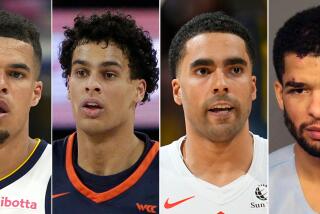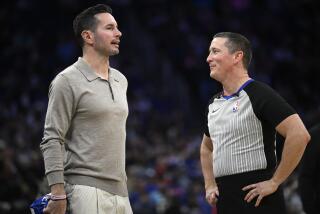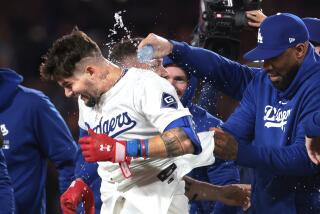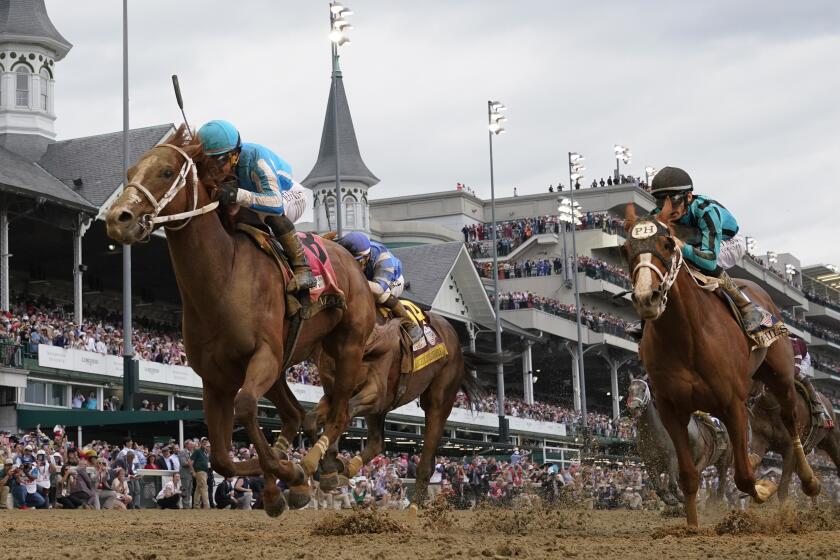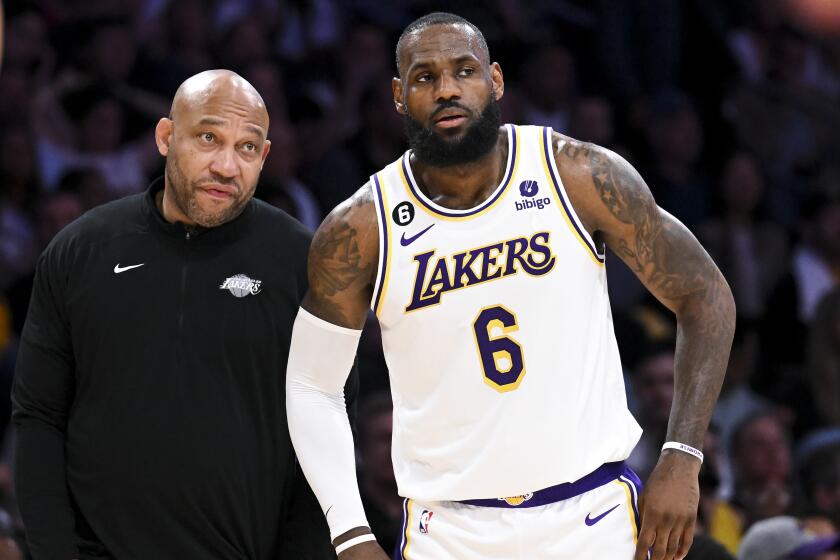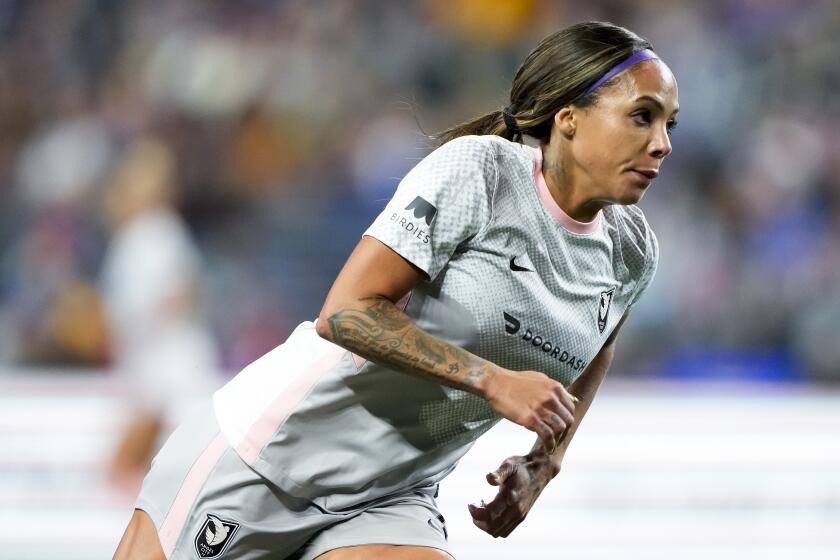NFL Reviews Matter of Trust
The Dallas Cowboys would like to be a little more like the New York Yankees in their ability to parlay their big fan base into big money.
But there’s a slim possibility of that happening, even though the 40-year-old NFL Trust expires Wednesday.
For four decades, the lucrative NFL licensing and sponsorship business has been governed by the little-known trust, unique in professional sports, in which all teams share equally in most revenue they generate.
The league’s philosophy of revenue sharing, which the trust reflects, has yielded competitive balance among teams, enviable labor harmony and unrivaled prosperity among owners, helping turn millionaires into billionaires. It has allowed small markets such as Green Bay, Wis., to not only keep their teams but compete on equal footing with rivals from New York, Chicago, San Francisco, Miami and other major cities.
Although most NFL observers will be more focused on minor changes to the rule book being discussed at this week’s league meetings, an extension of the trust is far and away the issue closest to the owners’ hearts.
Revenue sharing “is one of the biggest reasons why our sport is so strong,” said Robert Kraft, owner of the New England Patriots.
Although the trust represents the NFL’s revenue-sharing philosophy, it does not apply to the annual $80-million payout each team gets from the equal sharing of television money. Last season, each team received roughly $4 million from the national licensing and sponsorship deal -- one that encompasses sales of jerseys, hats, video games and NFL sponsorships such as Pepsi and Coors.
Unlike in baseball and hockey, where there’s a huge spending-power disparity between teams in small and large markets, the NFL has a salary cap and revenue sharing that gives hope to all 32 teams. No one is suggesting the NFL do away with that agreement in favor of a market-based system, but some team owners -- namely Dallas’ Jerry Jones, Washington’s Dan Snyder and Oakland’s Al Davis -- are in favor of more local marketing control, control that could generate substantially more cash for their teams.
Jones, for one, has always wanted the freedom to control the Cowboys’ licensing, sideline sponsorships and local merchandise distribution -- only some of which the trust now affords him -- and essentially believes he can market his team better than the league office can. And, the reasoning goes, if he does the extra legwork to sell his product, why should he have to share all the fruits of his labor?
“There’s the rub,” said David Carter, a USC professor who specializes in the economics of sports. “How do you continue to build a league brand while still enabling owners to build their own brands? If you don’t encourage these owners to take chances and focus on marketing to generate revenue, it will be difficult to continue to build the league brand.”
On the slim chance that the thinking of Jones and Snyder were to prevail, however, they would be able only to market their teams within a 75-mile radius of their home cities, according to the collective-bargaining agreement.
Even so, if the Cowboys controlled their sideline sponsorships, for example, they would have the right to make their own sports drink, headset and official apparel deals -- even though the NFL has national deals with Gatorade, Motorola and Reebok.
“What I am about is creating the incentive for each club to go out and basically promote their teams,” Jones said in a recent interview on the NFL Network. “And we’ve got some that do a great job, we’ve got others that don’t do as well, I’m all for that. And I’m for all the incentives and disincentives that go along with it.”
Jones already broke away from the pack in 1995, when he signed on with Pepsi and Nike -- pacts the league called “ambush marketing deals” -- even though at that time the NFL had agreements with Coke and Players Inc., the licensing arm of the NFL Players Assn.
That prompted the league to sue the Cowboys for more than $300 million and ask the court to order Jones and the Cowboys to stop violating their agreements with NFL Properties regarding club marks and logos. Jones responded by filing a $700-million countersuit, accusing the league of blocking teams from conducting their own marketing business.
In late 1996, the sides settled their dueling lawsuits, and the Cowboys were allowed to keep their new sponsorship deals. That opened the door for other NFL teams to secure their own local beer and soft drink deals, and after that the trust was tweaked accordingly.
The proposed 15-year extension of the trust, called the master agreement, is expected to pass when owners vote on it this week. Jones and others have argued, though, that the trust vote should require unanimous approval, not merely the three-quarters majority required on every other vote put before the owners. Exactly how that disagreement will be settled is unclear.
Regardless, there is a strong sentiment among most of the owners to keep the principles of the trust intact.
“We’d all like to have a competitive advantage because we had more money,” said Pat Bowlen, owner of the Denver Broncos. “But that’s sort of a selfish way to do business, because it comes back to haunt you in the long run. Because if there’s only two or three teams that can win a championship, you really don’t have a good fan base. It’s hard to be a fan of a team that’s out of it before the season starts. To me, that’s why the policy of sharing revenues is extremely important.”
The most amazing thing about the trust, which was conceived in part by the late Pete Rozelle, is that it brings together as business partners a group of very rich men and women not normally accustomed to equally sharing their funds.
“It was quite a courageous thing to do,” said Kraft, whose Patriots have won two of the last three Super Bowls. “People had a sense of what was best for the league, so that today people in any market, in all 32 of our markets, fans of those teams can believe that they have a shot of going to the playoffs and thereby going to the Super Bowl.”
With the cost of an NFL franchise inching ever closer to $1 billion, the pressure to make money is great -- and not just to enrich team owners. Kraft’s Patriots play in a 2-year-old stadium that was entirely privately financed. Like many clubs, among them Washington, Dallas and Tampa Bay, New England has retail shops to sell team gear.
“On the surface, [the Patriots would] do better financially in the short term without the trust,” Kraft said. “But I don’t think that’s the best thing for our business. And I’m going to work very hard to do whatever I can to try to keep it going the way it is.”
The future of the trust is a significant concern to the players’ union too. A baseball-type system of haves and have-nots would ultimately hurt the players, said Gene Upshaw, executive director of the NFL Players Assn.
“We will fight [a revision to the trust] tooth and nail, because every team does not have a level playing field,” Upshaw said before this year’s Super Bowl. “I have always liked to use the analogy that all of our players can’t go play for the New York Yankees. Someone has to go to some of the other teams. We are only interested in [getting] a fair share among all the teams. And if any owner thinks he is going to go off on his own, that could be a real big problem.”
Not so, says Andrew Zimbalist, an economics professor at Smith College in Northampton, Mass., and author of many articles and books on the sports industry. Even if the trust were to go away, he said, it wouldn’t change the fan experience much.
“You might see the NFL brand a little bit less often and the team brands a little bit more often in advertising,” he said. “The NFL might claim that this would be heretical and cataclysmic and all that, but I just don’t think it would be that big of a deal.”
More to Read
Get our high school sports newsletter
Prep Rally is devoted to the SoCal high school sports experience, bringing you scores, stories and a behind-the-scenes look at what makes prep sports so popular.
You may occasionally receive promotional content from the Los Angeles Times.
